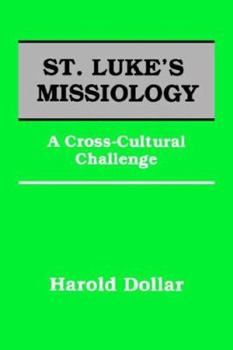St. Luke's Missiology:: A Cross-Cultural Challenge
Select Format
Select Condition 
Book Overview
This book touches on the fundamental contributions of Luke's two-volume work revealing how a small Jewish sect became a worldwide movement in one generation. It recognizes the essential unity of Luke-Acts by showing how Luke prepares for the book of Acts. Luke's story of how the gospel moves from the particular to the universal gives insights on the missiological dynamics of early Christianity and provides models for the church and missions today.
Format:Paperback
Language:English
ISBN:0878082670
ISBN13:9780878082674
Release Date:June 1996
Publisher:William Carey Library Publishers
Length:212 Pages
Weight:0.65 lbs.
Dimensions:0.5" x 6.0" x 9.0"
Customer Reviews
2 ratings
My Review of This Book for a Fuller-Seminary Class
Published by Thriftbooks.com User , 21 years ago
A Summary of the Book:Luke-Acts detailed God's salvation of the Gentiles without their becoming Jewish. Jesus constantly defied the religious-cultural-ethnic-geographic particularity of Judaism by including the marginalized. Hellenist Christians, like Stephen, continued this challenge against Jewish exclusive particularity, leading to the dispersion beyond Judea of the Hellenists, and also of the Gospel. The early church's inertial Jewish particularity became decisively shattered by Cornelius' conversion through a Spirit-guided Apostle Peter, and through Paul's post-conversion gradual paradigm shift towards universality. The Aramaic-Greek linguistic crack in the early church led to different theological foci on Christ's death and resurrection --- more than the Hebraic Christians, the Hellenist Christians might have questioned their Christian faith's relation with the Law and the Temple and the larger world. Luke introduced the Hellenists in Acts 6:1-6 via the food distribution problem. The martyrdom speech of Stephen, a Hellenist, implicated that God was not limited to Jerusalem but could work anywhere in the Diaspora. In Acts 7:1-43, Stephen highlighted God's revelation to with the patriarchs Abraham, Joseph and Moses outside the Promised Land, thereby challenging the claimed exclusivity of Jerusalem; in Acts 7:44-50, Stephen argued that tabernacle was superior to the Temple. Stephen's message implied that commitment to Jesus required a re-evaluation of the particularistic religious tradition in the Mosaic Law and the Temple. Stephen's paradigm change brought down the wrath of the entire Jewish nation on the Hellenist Christians. With the death of Stephen, the Hellenist Christians were dispersed in Acts 8:1, even while the more Hebraic Apostles remained in Jerusalem. Peoples historically unacceptable within Judaism found ready acceptance within the geographically expanding Jesus messianic movement, like the Samaritans and the eunuch from Ethiopia in Acts 8. Cornelius' conversion through a Spirit-directed Peter in Acts 10:1-11:18 revealed that the Gentiles' conversion was no problem for God; the problem was to bring Jewish Christians to recognize that Gentiles needed not become Jews as they became Christians. As God had included the Gentiles, the church ought not resist the Gospel's universalization. The Apostle Peter represented a valid missiological model in his own extended process of a major paradigm shift on his ministry to the Gentiles.Paul's post-conversion sojourn in Arabia and his early missions' near-exclusive focus on Jewish synagogues suggested a gradual paradigm change also in Paul. Though the Apostles experienced this paradigm change before Paul, Paul was first to grasp its full dimensions.The Hellenists (e.g., Stephen, Philip, Paul), being Hebrew-and-Greek bicultural, "bridged" the early church's expansion from Palestine into the larger Greek-speaking Roman Empire. Such "bridging people", comfortable in disparate cultures, are es
The Great Commission in Action
Published by Thriftbooks.com User , 21 years ago
In writing my critical papers in college, reading Prf. Dollar?s book twice (2002 & 2003) helped me see deeper into the New Testament gospel movement from the particular to the universal that began in 1st Century?s tiny Jewish sect in Jerusalem and the diaspora. The book clarifies the misunderstanding in which Acts written by Luke in narrative style, contains more than world history. The book also helped me understand its context through specific disciplines crucial to missiology. The book will explain why the present-day global missions are low in the missiological scale. The book reminds the reader that the Great Commission calls for universal application relevant to the present-day church. The west is far different than the culture of the east. The book will then challenge both the western church and individuals in ?how to? respond to cross-cultural challenge and its frontier like the New Testament early Christians when promoting Christianity in the Greco-Roman world.





